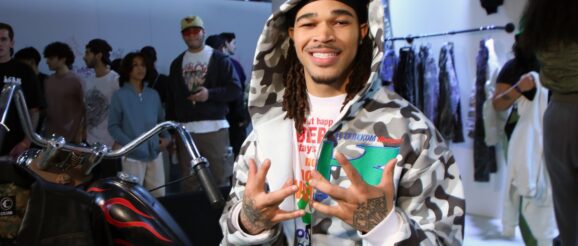PlaqueBoyMax and the rise of the streamer as rap artist

YouTube star PlaqueBoyMax built his following the usual way, with livestreamed opinions and interviews. His latest move, however, tests the meaning of the word “creator”
YouTube
I hadn’t thought of Max as anything more than a self-promoter making a savvy play for attention until a few weeks ago — when, on March 20, he debuted LONDON, an EP of songs recorded during a set of In The Booth streams with U.K. rappers. It’s not the first official music he has released, but it is his first play as a top-billed artist in the vein of a Metro Boomin or DJ Khaled. A week later, he was announced as a performer at the rap festival Summer Smash; on the poster, his name is nestled between past In The Booth guests Babytron and Lazer Dim 700. If he’d read until now as an earnest hobbyist (there’s a moment during his session with the rapper Ian where he calls someone mid-setup to troubleshoot a recording snafu), these moves indicate a clear desire to be something more.
It may have been inevitable that such a figure would come along, vying to be both a part of the commentator class and a serious player in the industry it covers. The other influencers are just as interested in insinuating themselves into rap theater — Akademiks was effectively positioned as a Drake propagandist and hype man in the feud with Kendrick Lamar — they just never sought to be participants to this degree. Max wouldn’t be the first social media star to parlay that visibility into production work — the Vine star Jay Versace has since produced for SZA, Doja Cat, Westside Gunn and Tyler, the Creator — but he might be the first to harness the power of his platform to turn producing itself into content that can then springboard a music career. And perhaps it’s only natural for recognition to beget professional ambitions — something similar has taken hold of niche platform stars like Addison Rae — but most cases don’t have a built-in conflict of interest. Max’s domain, which oscillates between vlogs, off-the-cuff reviews, puff interviews and personal plugs, is a field of mushy distinctions between commentary and promotion, and is representative of the complex landscape we’ve entered, where a “creator” can be both a person who makes music and one who shapes discourse.
YouTube
It must be noted that even as In the Booth takes off, Max has continued to post reaction videos. He reacted to Young Thug getting released from jail. He reacted to Kendrick Lamar’s Super Bowl halftime performance and Drake’s collab album with PARTYNEXTDOOR. He reacted to Playboi Carti’s set at Rolling Loud LA. In the Booth and Song Wars are now the tent poles around which he builds his supplemental content, mixing day-in-the-life vlogs with rambling conversations with guests like Kevin Gates and hooper turned rapper LiAngelo Ball. No matter how you define him — a pro commentator and an amateur musician, an amateur commentator and a pro musician, pro at both or amateur at both — there’s a weird friction created by his operation, which seems to weaponize his following toward both ends. Kenny Beats was just a producer who recorded some of his sessions as a look behind the curtain; he wasn’t also a talking head and interviewer. And someone like Will Smith exists so beyond Max’s creative orbit that each of them feels, overwhelmingly, like a publicity tool for the other. The song they assembled together doesn’t need to exist beyond its utility as a peg for the series, and the series is the thing that keeps people watching.
